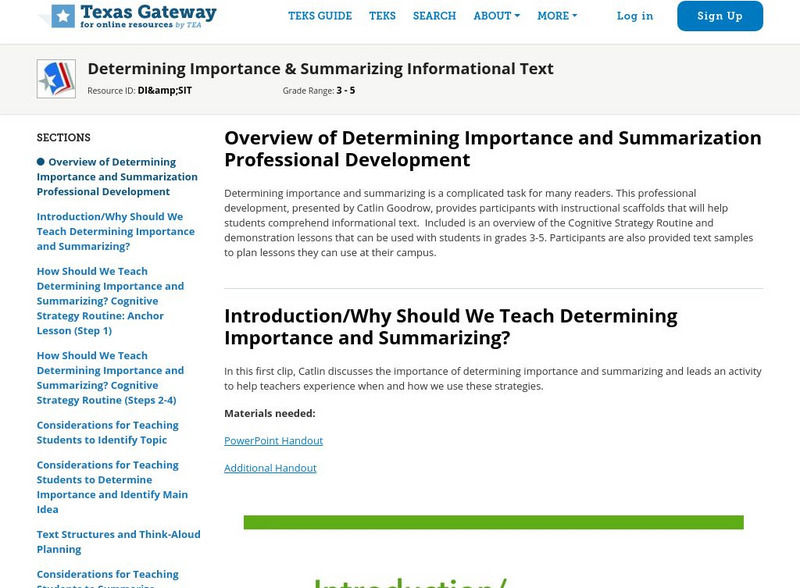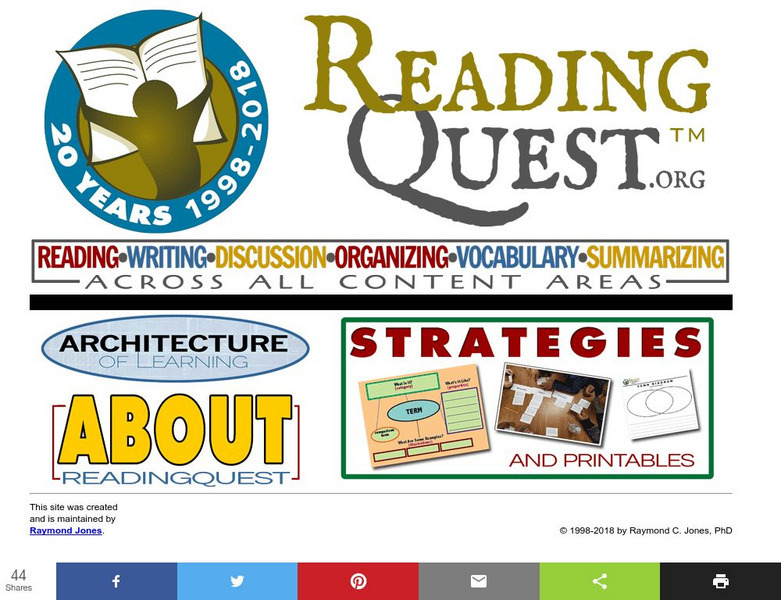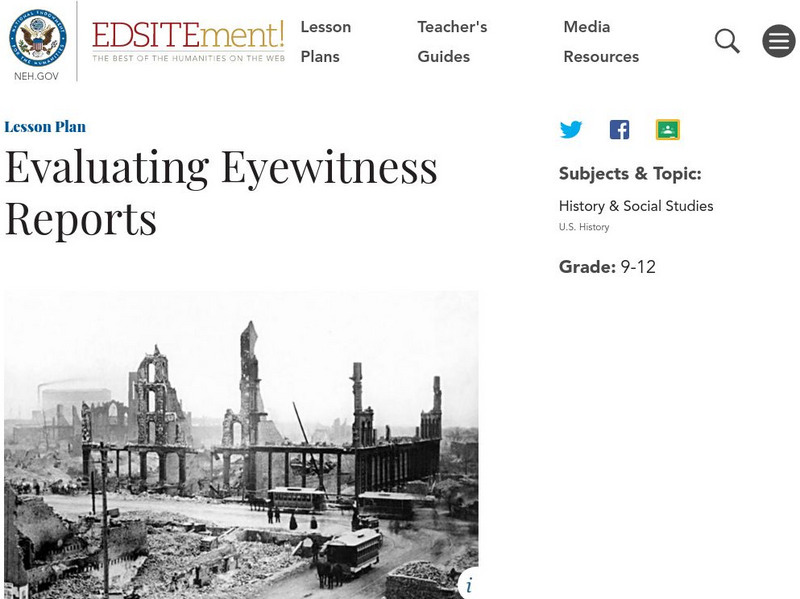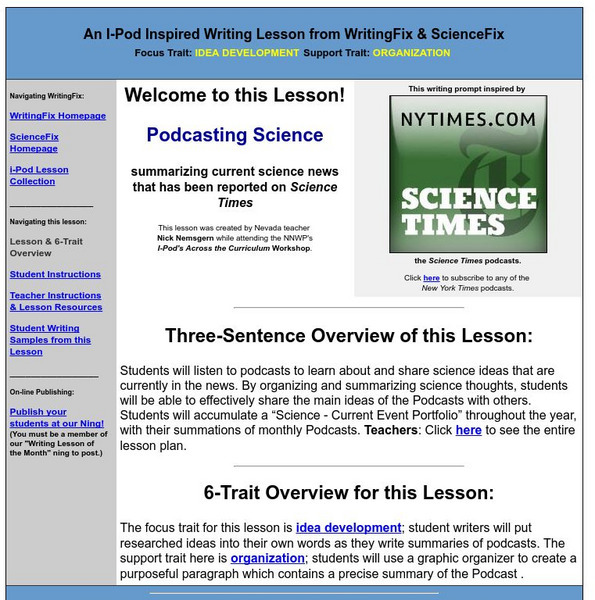Sophia Learning
Sophia: Reading Comprehension and Classroom Discussions
This tutorial focuses on active reading comprehension strategies including reading aloud, taking notes, summarizing, and writing in the margins of books to improve retention and class discussion. It includes two Flickr videos on active...
Polk Brothers Foundation Center for Urban Education at DePaul University
De Paul University: Center for Urban Education: Comprehensive Assessment: Nonfiction [Pdf]
Questions are provided to help students determine the main idea, topic, purpose, and opinion of a piece of nonfiction. Students are prompted to write a summary of the informational text.
Daily Teaching Tools
Daily Teaching Tools: Free Graphic Organizers for Planning and Writing
This Daily Teaching Tools resource provides graphic organizers that students can use to plan their written pieces. Graphic organizers for all modes of writing are provided.
Texas Education Agency
Texas Gateway: Summarize Informational/expository Text (English 6 Reading)
[Accessible by TX Educators. Free Registration/Login Required] Learn how to summarize the main ideas and supporting details in text and understand that a summary does not include opinions.
Texas Education Agency
Texas Gateway: Summarize Informational/expository Text
[Accessible by TX Educators. Free Registration/Login Required] You will learn how to summarize main ideas, supporting details, and relationships among ideas within expository text.
Texas Education Agency
Texas Gateway: Determining Importance & Summarizing Informational Text
These teacher resources focuses on why it is important to teach elementary students to determine the importance and to summarize informational text. It leads an activity to help teachers experience when and how we use these strategies.
Texas Education Agency
Texas Gateway: Distinguish Between Summary and Critique (English I Reading)
In this lesson, students will learn how to write an effective summary using reading strategies to help ensure that the summary contains enough information without including unnecessary details or personal opinions. You will also learn...
Texas Education Agency
Texas Gateway: Distinguish Between Summary and Critique (English Ii Reading)
This lesson will focus on summary and critique separately so that you can distinguish between the two. You will learn how to summarize a text and how to distinguish between essential and nonessential information when summarizing. You...
Other
Reading Quest: Making Sense of Social Studies
Teaching students to read well in areas other than language arts requires teaching and reinforcing the kinds of reading strategies taught here. There are 27 strategies, ranging from brainstorming to word mapping. The site includes PDF...
PBS
Pbs Learning Media: The Fourteenth Amendment Part Ii
In this video segment from The Supreme Court, learn about the 1883 Supreme Court decision that marked the end of federal protections for individuals in states and the beginning of Jim Crow segregation.
National Endowment for the Humanities
Neh: Edsit Ement: Evaluating Eyewitness Reports
In this lesson, students practice working with primary documents by comparing accounts of the Chicago Fire and testing the credibility of a Civil War diary.
Michigan State University
Michigan State University: Intervention for Reading: Summarization Strategy
Improve understanding of expository materials by summarizing the main ideas. The summarization strategy helps young scholars recall the main ideas and specific facts of materials they read. There are five rules for writing summaries.
Writing Fix
Writing Fix: An I Pod Inspired Writing Lesson: Podcasting Science
Using "Science Times" at NewYorkTimes.com, students will listen to podcasts to learn about and share science ideas that are currently in the news. By organizing and summarizing science thoughts, students will be able to effectively share...
Polk Brothers Foundation Center for Urban Education at DePaul University
De Paul University: Center for Urban Education: Our Streets [Pdf]
"Our Streets" is a one page, nonfiction passage about how streets are designed, built, signed, and maintained. It is followed by an open-ended question which requires students to provide evidence from the story; it includes underlining...
Polk Brothers Foundation Center for Urban Education at DePaul University
De Paul University: Center for Urban Education: Prairie Ecology [Pdf]
"Prairie Ecology" is a one page, nonfiction passage about the tallgrass prairie ecosystem and how it works using three animals: the skipper butterfly, ground squirrel, and the bison It is followed by an open-ended question which requires...
Polk Brothers Foundation Center for Urban Education at DePaul University
De Paul University: Center for Urban Education: Traveling West [Pdf]
"Traveling West" is a one page, nonfiction passage about pioneers traveling west in wagon trains. It is followed by questions which require students to provide evidence from the story; it includes underlining the most important...
Polk Brothers Foundation Center for Urban Education at DePaul University
De Paul University: Center for Urban Education: What Is a Fable? [Pdf]
"What is a Fable?" is a one page, nonfiction passage about what a fable is including animals that talk and a lesson learned. It is followed by an open-ended question which requires students to provide evidence from the story; it includes...
Polk Brothers Foundation Center for Urban Education at DePaul University
De Paul University: Center for Urban Education: Working at the Hospital [Pdf]
"Working at the Hospital" is a one page, nonfiction passage about the various jobs of people who work in a hospital. It is followed by questions which require students to provide evidence from the story; it includes underlining the most...
Polk Brothers Foundation Center for Urban Education at DePaul University
Depaul University: Center for Urban Education: Chicago Changer, Jane Addams[pdf]
"Chicago Changer, Jane Addams" is a one page, biographical passage about Jane Addams, Chicago's first changer. She helped poor people and immigrants to find homes and learn English. It is followed by an open-ended question which requires...
Polk Brothers Foundation Center for Urban Education at DePaul University
De Paul University: Center for Urban Education: Chicago High Schools [Pdf]
"Chicago High Schools" is a one page, nonfiction passage about Chicago high schools, including a variety of specialty high schools and the basic requirments met by all of their high schools. It is followed by an open-ended question which...
Polk Brothers Foundation Center for Urban Education at DePaul University
De Paul University: Center for Urban Education: Plants and Places [Pdf]
"Plants and Places" is a one page, nonfiction passage about how plants fit the types of environment they live in such as cactus like hot, dry weather and live in Arizona. The state flowers fit the climate of the states. It is followed by...
Polk Brothers Foundation Center for Urban Education at DePaul University
De Paul University: Center for Urban Education: Prairie Changes [Pdf]
"Prairie Changes" is a one page, nonfiction passage about the changes in the prairie over time and the effect it has on plants, animals, and habitats. It is followed by an open-ended question which requires students to provide evidence...
Polk Brothers Foundation Center for Urban Education at DePaul University
De Paul University: Center for Urban Education: Space Food [Pdf]
"Space Food" is a one page, nonfiction passage about how astronauts prepare and eat food and clean up afterward to stay healthy. It is followed by an open-ended question which requires students to provide evidence from the story; it...
Polk Brothers Foundation Center for Urban Education at DePaul University
De Paul University: Center for Urban Education: Early Chicago Environment & People [Pdf]
"Early Chicago Environment & People" is a one page, nonfiction passage about the Native Americans who lived in what is now Chicago. It explains how they lived and how Chicago got its name. It is followed by constructed-response...



![De Paul University: Center for Urban Education: Comprehensive Assessment: Nonfiction [Pdf] Unknown Type De Paul University: Center for Urban Education: Comprehensive Assessment: Nonfiction [Pdf] Unknown Type](https://d15y2dacu3jp90.cloudfront.net/images/attachment_defaults/resource/large/FPO-knovation.png)









